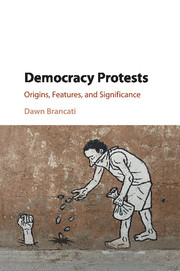Crossref Citations
This Book has been
cited by the following publications. This list is generated based on data provided by Crossref.
Mbaku, John Mukum
2017.
Constitutions and Citizenship: Lessons for African Countries.
International and Comparative Law Review,
Vol. 17,
Issue. 1,
p.
7.
Cunningham, David E
Gleditsch, Kristian Skrede
González, Belén
Vidović, Dragana
and
White, Peter B
2017.
Words and deeds.
Journal of Peace Research,
Vol. 54,
Issue. 4,
p.
468.
Thomson, Henry
Buhaug, Halvard
Rosvold, Elisabeth
and
Urdal, Henrik
2017.
Democratization, Elections and Urban Social Disorder in the Developing World, 1960-2014.
SSRN Electronic Journal,
Svolik, Milan
2018.
When Polarization Trumps Civic Virtue: Partisan Conflict and the Subversion of Democracy by Incumbents.
SSRN Electronic Journal,
Teorell, Jan
and
Wahman, Michael
2018.
Institutional stepping stones for democracy: how and why multipartyism enhances democratic change.
Democratization,
Vol. 25,
Issue. 1,
p.
78.
Butcher, Charles
Gray, John Laidlaw
and
Mitchell, Liesel
2018.
Striking It Free? Organized Labor and the Outcomes of Civil Resistance.
Journal of Global Security Studies,
Vol. 3,
Issue. 3,
p.
302.
Almeida, Paul D.
2018.
The Wiley Blackwell Companion to Social Movements.
p.
43.
Morgenbesser, Lee
and
Pepinsky, Thomas B.
2019.
Elections as Causes of Democratization: Southeast Asia in Comparative Perspective.
Comparative Political Studies,
Vol. 52,
Issue. 1,
p.
3.
Lawson, George
2019.
Anatomies of Revolution.
Lucardi, Adrián
2019.
Strength in Expectation: Elections, Economic Performance, and Authoritarian Breakdown.
The Journal of Politics,
Vol. 81,
Issue. 2,
p.
552.
Breslawski, Jori
and
Cunningham, David E.
2019.
International Influences on Nonviolent and Violent Contention.
International Interactions,
Vol. 45,
Issue. 4,
p.
638.
Kim, Nam Kyu
and
Kroeger, Alex M
2019.
Conquering and coercing: Nonviolent anti-regime protests and the pathways to democracy.
Journal of Peace Research,
Vol. 56,
Issue. 5,
p.
650.
Brancati, Dawn
and
Lucardi, Adrián
2019.
What We (Do Not) Know about the Diffusion of Democracy Protests.
Journal of Conflict Resolution,
Vol. 63,
Issue. 10,
p.
2438.
Dahlum, Sirianne
and
Wig, Tore
2019.
Chaos on Campus: Universities and Mass Political Protest.
SSRN Electronic Journal,
Brancati, Dawn
and
Lucardi, Adrián
2019.
Why Democracy Protests Do Not Diffuse.
Journal of Conflict Resolution,
Vol. 63,
Issue. 10,
p.
2354.
Sato, Yuko
and
Wahman, Michael
2019.
Elite coordination and popular protest: the joint effect on democratic change.
Democratization,
Vol. 26,
Issue. 8,
p.
1419.
Weyland, Kurt
2019.
Why Some Democracy Protests Do Diffuse.
Journal of Conflict Resolution,
Vol. 63,
Issue. 10,
p.
2390.
Hyde, Susan D.
2020.
Democracy’s backsliding in the international environment.
Science,
Vol. 369,
Issue. 6508,
p.
1192.
Bernhard, Michael
Hicken, Allen
Reenock, Christopher
and
Lindberg, Staffan I.
2020.
Parties, Civil Society, and the Deterrence of Democratic Defection.
Studies in Comparative International Development,
Vol. 55,
Issue. 1,
p.
1.
Tanneberg, Dag
2020.
The Politics of Repression Under Authoritarian Rule.
p.
77.





